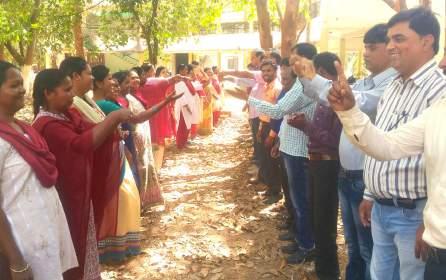
1 minute read
Sri Aurobindo Society
from MHRD Compendium
by renure
In 2015, Sri Aurobindo Society launched one of the world’s largest programs to transform government schools. Called as Rupantar, it aims to create a teacher-centric ecosystem of education stakeholders, working in synergy to achieve the objectives of the State and Centre-run education programs Area of Intervention Teacher motivation, support to CWSN, innovation in education Key Geography 12 states across India Need for the initiative Problem Shortage of 1 million teachers in the country, and declining quality and credibility of government school education Situation Before • Teacher absenteeism, poor classroom management, outdated teaching techniques • Lack of motivation, support and recognition for teachers • Poor learning outcomes; 100% drop out of children with ‘hidden disabilities’ Intervention
Overview
Advertisement
Rupantar is bringing about a transformation in government school education by motivating and up-skilling teachers, and making zero-investment innovation in classrooms a part of their daily job
Steps • 10-day motivational training of teachers based on integral education • Identification of teachers’ ‘zero investment’ best practices and their implementation in thousands of schools every year; grand felicitation of teachers at state level • 4-day Special Education Training of regular teachers to enable them to identify children with neurodevelopment disorders; psychological tests and counselling of students; on-the-job handholding of teachers by special educators
Resources
Necessary approvals and MoUs with State governments Over 200-strong team Financial resources from Corporate CSR funding; small contribution from State governments include TA/DA expenses of the participants
Impact and Key Learning Achieved so far • Motivated teachers, working together and innovating their classrooms • Increased student enrolment, attendance, learning outcomes • Improved dropout rates, morals and values, and the quality of life of CWSN
Key Learning • For large transformation projects, it is critical to engage State administrators in program design from the start • To achieve mass scale improvement through people, it is essential to eliminate monetary investment as a success factor










